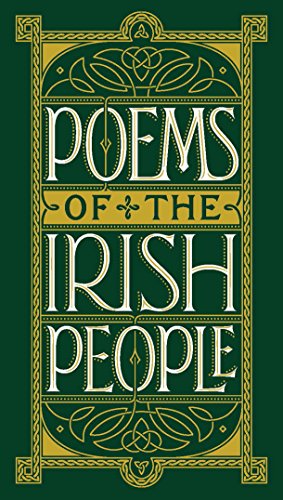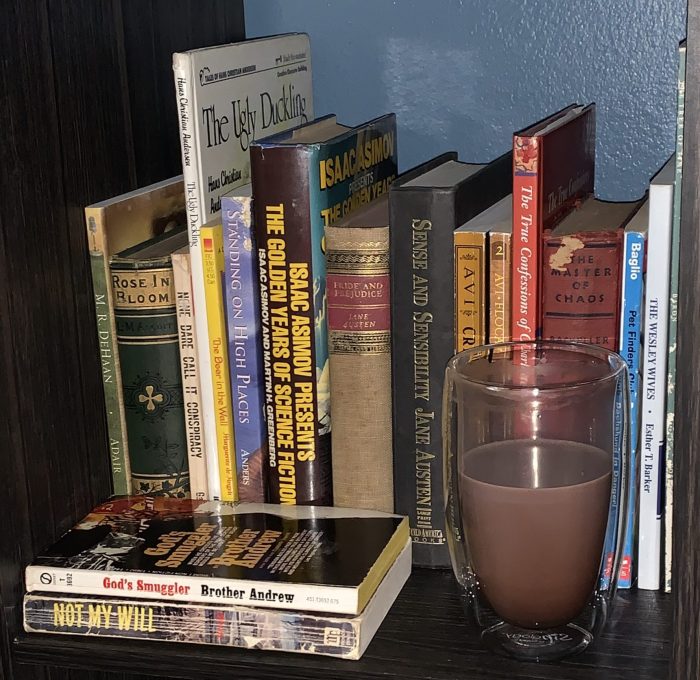I heard the Poor Old Woman say:
"At break of day the fowler came,
And took my blackbirds from their songs
Who loved me well thro' shame and blame.
"No more from lovely distances
Their songs shall bless me mile by mile,
Nor to white Ashbourne call me down
To wear my crown another while.
"With bended flowers the angels mark
For the skylark the place they lie,
From there its little family
Shall dip their wings first in the sky.
"And when the first surprise of flight
Sweet songs excite, from the far dawn
Shall there come blackbirds loud with love,
Sweet echoes of the singers gone.
"But in the lonely hush of eve
Weeping I grieve the silent bills."
I heard the Poor Old Woman say
In Derry of the little hills.
("Lament for the Poets: 1916", by Francis Ledwidge, printed in Poems of the Irish People, 2016)
Author: Cadie (Page 20 of 46)
“[Roosevelt] wrote to his sister Coni at the time that Edith “was sweet in many different things … I don’t think even I had known how wonderfully good and unselfish she was; she is naturally reserved and finds it especially hard to express her feelings on paper.” In later years he wrote that Edith had made the “real happiness” in his life.”
Lion in the White House, Aida D. Donald
After only a few short years of marriage, Roosevelt’s first wife, Alice, died of kidney disease. She had just given birth to their first baby, Alice Lee, who was named for her mother. A year later, Roosevelt wrote this tribute to his dead wife:
“I … loved her as soon as I saw her sweet, fair young face … We spent three years of happiness such as rarely comes to a man or woman … Fair, pure, and joyous as a maiden; loving, tender, and happy as a young wife; when she had just become a mother, when her life seemed to be but just begun, and when the years seemed so bright before her – then by a strange and terrible fate, death came to her. And when my heart’s dearest died, the light went from my life forever.”
Theodore Roosevelt, as quoted in Lion in the White house, Aida D. Donald
“For him the bedrock of politics was morality, and business practices that bilked citizens were immoral. Looking back at those times in his autobiography, Roosevelt wrote that ‘honesty … and decency … and administrative efficiency are the prime requisites for a legislator.'”
Lion in the White House, Aida D. Donald
“In getting out the vote, Roosevelt was a human steam engine in a pince-nez, and he constantly stressed his distance from party bosses and corrupt interests.”
Lion in the White House, Aida D. Donald

This little book of Irish poems has been really fun to read. I started it on a sick day when I wanted something simple to read, and I’m so glad I did. It’s a small, pocket-sized book with 65 poems by about forty-six authors named authors, 2 translators, and a few anonymous authors. Most of the authors I hadn’t heard of, but you may recognize William Butler Yeats among the names. Perhaps some of these authors only wrote a handful of poems. I’m glad they were included in this little volume. Here is the list of features authors (including links to the poems I posted).
- Anonymous
- Cecil Frances Alexander
- William Allingham
- Edmund John Armstrong
- John Banim
- Ethna Carbery
- William Carleton
- John Keegan Casey
- Andrew Cherry
- Nora Chesson
- Luke Aylmer Conolly
- Thomas Osborne Davis
- Aubrey de Vere
- William Drennan
- Samuel Ferguson
- Ellen Forrester
- Alice Furlong
- Eva Gore-Booth
- Alfred Percival Graves
- Stephen Lucius Gwyn
- Katharine Tynan Hinkson
- Nora Hopper
- John Kells Ingram
- Thomas Caulfield Irwin
- James Joyce
- Rose Kavanagh
- Carles Joseph Kickham
- William Larminie
- Emily Lawless
- Francis Ledwidge
- Samuel Lover
- Francis Sylvester Mahoney
- Thomas D’Arcy McGee
- Thomas Moore
- Alice Mulligan
- Ellen O’Leary
- James Orr
- Seems O’Sullivan
- George Nugent Reynolds
- T.W. Rolleston
- Dora Sigerson Shorter
- John Millington Synge
- John Todhunter
- Edward Walsh
- John Walsh
- Lady Wilde
- William Butler Yeats
- translator Michael Cavanagh
- translator James Clarence Mangan
Happy Saturday to you, my readers. And happy birthday to me! I’m currently celebrating by drinking Amaretto Hot Chocolate and working on some new posts. I hope you have enjoyed the Irish Poems over the last few weeks. Now I’m going to start adding some new words, quotes, and interesting facts about Teddy Roosevelt from the biography I’m reading, Lion in the White House. I did not know just how full a life he lived before he ever became president.
Fund Fact: Did you know that presidential inaugurations used to held on March 4?

I
Little Cowboy, what have you heard,
Up on the lonely rath's green mound?
Only the plaintive yellow bird
Sighing in sultry fields around,
Chary, chary, chary, chee-ee! -
Only the grasshopper and the bee? -
"Tip tap, rip-rap,
Tick-a-tack-too!
Scarlet leather, sewn together,
This will make a shoe.
Left, right, pull it tight;
Summer days are warm;
Underground in winter,
Laughing at the storm!"
Lay your ear close to the hill.
Do you not catch the tiny glamour,
Busy click of an elfin hammer,
Voice of the Lepracaun singing shrill
As he merrily plies his trade?
He's a span
And a quarter in height.
Get him in sight, hold him tight,
And you're a made
Man!
II
You watch your cattle the summer day,
Sup on potatoes, sleep in the hay;
How would you like to roll in your carriage,
Look for a duchess's daughter in marriage?
Seize the Shoemaker - then you may!
"Big boots a-hunting,
Sandals in the hall,
White for a wedding-feast,
Pink for a ball.
This way, that way,
So we make a shoe;
Getting rich every stitch,
Tick-tack-too!"
Nine-and-ninety treasure-crocks
This keen miser-fairy hath,
Hid in mountains, woods, and rocks,
Ruin and round-tow'r, cave and rath,
And where the cormorants build;
From times of old
Guarded by him;
Each of them fill'd
Full to the brim
With gold!
III
I caught him at work one day, myself,
In the castle-ditch, where foxglove grows, -
A wrinkled, wizen'd, and bearded Elf,
Spectacles stuck on his pointed nose,
Silver buckles to his hose,
Leather apron - shoe in his lap -
"Rip-rap, Tip-tap,
Tick-tack-too!
(A grasshopper on my cap!
Away the moth flew!)
Buskins for a fairy prince,
Brogues for his son, -
Pay me well, pay me well,
When the job is done!"
The rogue was mine, beyond a doubt.
I stared at him; he stared at me;
"Servant, Sir!" "Humph!" says he,
And pull'd a snuff-box out.
He took a long pinch, look'd better pleased,
The queer little Lepracaun;
Offer'd the box with a whimsical grace, -
Pouf! he flung the dust in my face,
And, while I sneezed,
Was gone!
("The Lepracaum; or, Fairy Shoemaker" by William Allingham, printed in Poems of the Irish People, 2016)
This poem was better the second time I read it, so try it once more. Isn’t it cute? A story about a Lepracaun? It reads kind of like a conversation between two people, maybe one is older and wiser than the other, maybe a parent or grandparent speaking to a child? Whoever is telling the story builds the drama up, first describing the Lepracaun, then quoting it (as if they had heard it speak before). What gives more credibility to the story than describing the shoes the Lepracaun is making, as in the second stanza? Then for the best part: almost catching the Lepracaun. But he’s too clever. Poof! He throws snuff in the storyteller’s face and vanishes away. We may never know if the Lepracaun is real. He’s just too smart to get caught!
When all were dreaming
But Pastheen Power,
A light came streaming
Beneath her bower:
A heavy foot
At her door delayed,
A heavy hand
On the latch was laid.
"Now who dare venture,
At this dark hour,
Unbid to enter
My maiden bower?"
"Dear Pastheen, open
The door to me,
And your true lover
You'll surely see."
"My own true lover,
So tall and brave,
Lives exiled over
The angry wave."
"Your true love's body
Lies on the bier,
His faithful spirit
Is with you here."
"His look was cheerful,
His voice was gay;
Your speech is fearful,
Your face is grey;
And sad and sunken
Your eye of blue,
But Patrick, Patrick,
Alas! 'tis you!"
Ere dawn was breaking
She heard below
The two cocks shaking
Their wings to crow.
"Oh, hush you, hush you,
Both red and grey,
Or you will hurry
My love away.
"Oh hush your crowing,
Both grey and red,
Or he'll be going
To join the dead;
Or, cease from calling
His ghost to the mould,
And I'll come crowning
Your combs with gold."
When all were dreaming
But Pastheen Power,
A light went streaming
From out her bower;
And on the morrow,
When they awoke,
They knew that sorrow
Her heart had broke.
("Song of the Ghost" by Alfred Percival Graves, printed in Poems of the Irish People, 2016)
This poem is both sweet and sad, something I noticed with a lot of the Irish poems. Poor Pastheen, whose love was exiled and forced from his home. When he is dead, his spirit comes to claim the bride he never got to marry. Then she dies of a broken heart. At least the lovers were able to be together for one night, even if it was in death.
My love, still I think that I see her once more,
But, alas! she has left me her loss to deplore -
My own little Kathleen, my poor little Kathleen,
My Kathleen O'More!
Her hair glossy black, her eyes were dark blue,
Her colour still changing, her smiles ever new -
So pretty was Kathleen, my sweet little Kathleen,
My Kathleen O'More!
She milked the dun cow, that ne'er offered to stir;
Though wicked to all, it was gentle to her -
So kind was my Kathleen, my poor little Kathleen,
My Kathleen O'More!
She sat at the door one cold afternoon,
To hear the wind blow, and to gaze on the moon, -
So pensive was Kathleen, my poor little Kathleen,
My Kathleen O'More!
Cold was the night-breeze that sighed round her bower,
It chilled my poor Kathleen, she drooped from that hour,
And I lost my poor Kathleen, my own little Kathleen,
My Kathleen O'More!
The bird of all birds that I love the best
Is the robin that in the churchyard builds his nest;
For he seems to watch Kathleen, hops lightly o'er Kathleen,
My Kathleen O'More!
("Kathleen O'More, by George Nugget Reynolds, printed in Poems of the Irish People, 2016)
I’d like to think that Kathleen and Rory (from this poem) eventually got married, resulting in this lovely yet sad poem. Poor Rory, losing his sweet Kathleen.
